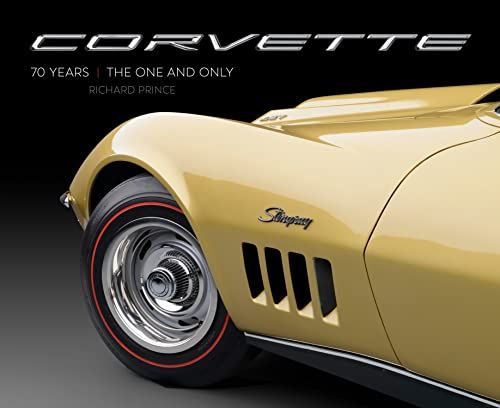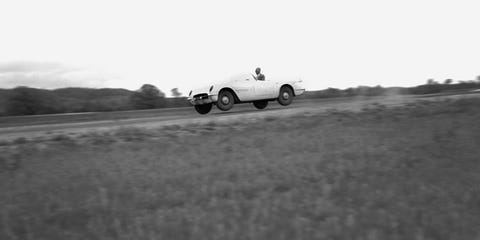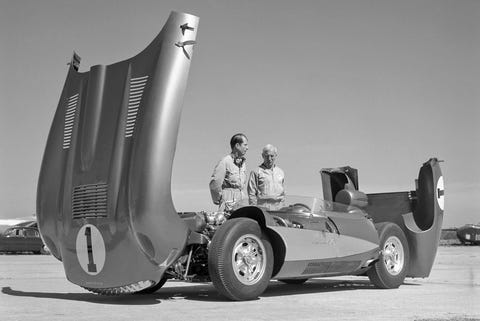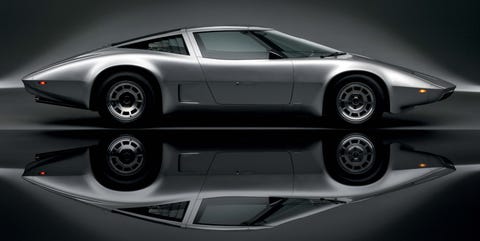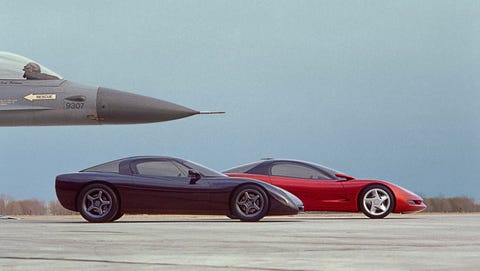Veteran automotive writer and photographer Richard Prince has just released his latest book, Corvette 70 Years: The One and Only (Motorbooks/Quarto $60.00), and it is a lavish love letter to a model Prince has cherished since he was a boy. “My connection to Corvette goes back to early childhood,” he told Car and Driver, recalling the time he first saw a mid-year C2. “I was smitten because it was, in my opinion, among the most beautiful cars ever produced. It was the car I wanted when I got my license.”
Prince’s infatuation has resulted not only in his having owned at least one Corvette consistently for the past 40 years, but in his founding, with his wife, a restoration shop specializing in Corvettes, his writing three previous books, and over 1500 articles on the model, and to his acting as official Corvette photographer for Chevrolet since the introduction of the C5.
This inside connection proved invaluable in the creation of the book, in which over half of the often rare (or previously unseen) images came from GM’s internal archives. But it also made perusing these annals occasionally uncanny. “Because I’ve worked with GM for so many years, thousands of my own images are in the archive,” Prince said. “So it was a bit surreal to be doing research and frequently coming across my own work.”
One would imagine that after telling the story of Chevy’s “Plastic Fantastic” sports car so often, there might be little else to discover. But Prince’s detailed approach to the subject yields fresh insights. He was particularly interested to ferret out new information on the origin of the Corvette in the early 1950s, at the dawn of America’s interest in sports cars.
“Perhaps the most surprising thing I found was an audio tape of a 1954 interview of GM styling vice president Harley Earl conducted by a Detroit-based journalist named Stanley Brams,” Prince said. In that interview, Earl states that the idea for creating Corvette came to him in September 1951 while he was at a sports car race in Watkins Glen, New York. “Mr. Earl was inspired by the huge crowds and intense enthusiasm he witnessed there in 1951,” he said. “Hearing directly from him in this taped interview answers the question definitively.”
He was also compelled to find that, despite the car’s iconic nature and marketplace success, its ongoing existence has often remained precarious. “It was surprising just how fragile Corvette’s survival has been over almost all of its history,” Prince said.
“It is well known that many at GM wanted to abandon it early on when sales were dismal,” he said, noting that at the end of the 1954 model year, about one-third of production remained unsold. “It’s not well known, however, that the car came very close to an unceremonious death numerous times over its 70-year history, including in recent decades when GM faced intense financial difficulties that ultimately led to its bankruptcy reorganization.” The Corvette was saved from the gallows repeatedly by passionate, powerful people within GM, who believed in its mission and drove this passion forward.
Prince believes in this mission as well, citing the compelling and unique nature of Corvette’s core equities: an intensely passionate enthusiast base, an unrivaled cost-to-performance ratio, high production numbers that fuel affordability on the new and used market, and the cars’ general durability and reliability.
But he’s no purist, and thankfully foregoes rallying against arcane changes like the move from round to square taillights, from pop-up to fixed headlamps, or even from a front- to a mid-engine layout. “A lot of enthusiasts, particularly the more vocal ones, are fiercely loyal to their favorite era, and decry any deviations from tradition,” he said. “I take an entirely different approach. Evolution and advancement are essential if Corvette is to survive.”
This makes his detailed and well-researched book more joyous to read (and look at), grounded as it is in the model’s lifelong and ongoing adaptation. With an all-electric Corvette confirmed and forthcoming, Prince’s perspective is at once timely and appreciated.
This content is imported from OpenWeb. You may be able to find the same content in another format, or you may be able to find more information, at their web site.

